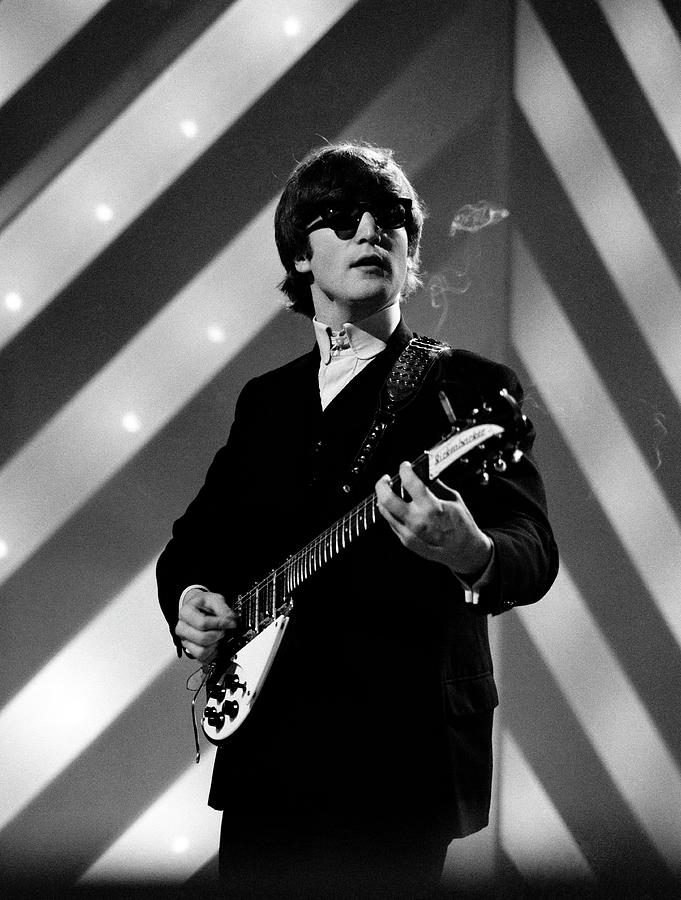In the pantheon of rock legends, few figures shine as brightly as John Lennon. As a founding member of The Beatles, Lennon left an indelible imprint on the world of music, culture, and activism.
While the entire band contributed to The Beatles' unprecedented success, Paul McCartney's insightful reflections reveal that John Lennon was more than just a bandmate.
According to McCartney, the Beatles viewed Lennon as a guiding light, akin to their "own little Elvis." These words provide a compelling glimpse into Lennon's role within the band and his enduring legacy.
The Birth of a Legend

John Lennon was born on October 9, 1940, in Liverpool, England, during the chaos of World War II. Raised primarily by his Aunt Mimi, Lennon's early life was marked by familial instability and personal tragedy.
Nevertheless, his rebellious spirit and innate creativity shone through from a young age. Lennon found solace and expression in music, an interest that would eventually become his life's work.
As a teenager, Lennon's world changed forever when he met Paul McCartney in July 1957 at a church fete in Woolton.
The two talented young men connected instantly, sharing a profound love for rock 'n' roll, which had already begun to sweep the globe thanks to icons like Elvis Presley.
Their chemistry set the stage for the formation of The Beatles, a band that would transform the music industry.
The Formation of The Beatles
The Beatles officially began in 1960 with Lennon, McCartney, George Harrison, and Pete Best on drums, who would later be replaced by Ringo Starr.
From local gigs in Liverpool to their electrifying performances in Hamburg, Germany, the band honed their craft and developed a unique sound, blending rock, pop, and a dash of rebellious flair.
As they evolved, it became clear that John Lennon was naturally emerging as the leader.
McCartney’s reflection on Lennon paints a vivid picture of his role within The Beatles. "He was like our own little Elvis," McCartney said. "We all looked up to John.
He was older and he was very much the leader; he was the quickest wit and the smartest." Lennon's charisma, quick wit, and sharp intellect made him a natural focal point for the band.
His older age and experience also conferred a sense of respect and admiration from his younger bandmates.
Lennon's Leadership and Influence

John Lennon's leadership played a crucial role in shaping the band's direction and identity.
His rebellious nature and willingness to push boundaries allowed The Beatles to explore new musical landscapes.
Lennon's lyrics, often introspective and laden with social commentary, contrasted beautifully with McCartney's more melodic and accessible contributions.
This dynamic created a perfect balance that defined The Beatles' sound.
An example of Lennon's incisive leadership can be seen in their groundbreaking album "Revolver." Songs like "Tomorrow Never Knows," with its avant-garde experimentation and philosophical depth, showcased Lennon's fearless creativity.
Similarly, "Strawberry Fields Forever" and "A Day in the Life" from the album "Sgt. Pepper's Lonely Hearts Club Band" exemplified his ability to blend personal introspection with universal themes, resulting in timeless music that resonates across generations.
Despite his assertive role, Lennon’s leadership was never overbearing. He valued collaboration and encouraged his bandmates to contribute their ideas freely.
This democratic approach allowed The Beatles to amalgamate their diverse talents, creating a body of work remarkable in its breadth and innovation.
Influence of Elvis Presley

For John Lennon, Elvis Presley was a monumental influence, shaping his early aspirations and approach to music.
Elvis represented the epitome of rock 'n' roll rebellion and charisma, qualities that Lennon admired deeply. "Nothing really affected me until I heard Elvis.
If there hadn't been an Elvis, there wouldn't have been The Beatles," Lennon once remarked.
Elvis's influence extended beyond just musical inspiration; it also fueled Lennon's ambition to transcend conventional boundaries and become a cultural icon.
This aspiration materialized through Lennon’s leadership, as he steered The Beatles to not only achieve commercial success but also embody the spirit of a generation seeking change and self-expression.
Lennon's Wit and Intellect
One of the defining characteristics that set John Lennon apart was his razor-sharp wit and keen intellect.
Whether in interviews, on stage, or during casual conversation, Lennon's quick humor and insightful observations never failed to captivate audiences.
This intellectual prowess was not merely superficial; it permeated his songwriting, imbuing his lyrics with layers of meaning and complexity.
Songs like "Imagine" and "Give Peace a Chance" underscore Lennon’s ability to distill profound social and political messages into simple yet powerful compositions.
His lyrics challenged listeners to think critically about the world around them, inspiring movements for peace and change.
McCartney’s comment about Lennon being "the quickest wit and the smartest" highlights this remarkable intellect that was both a driving force for The Beatles and a source of inspiration for millions.
Legacy and Enduring Influence

Although The Beatles disbanded in 1970, John Lennon’s impact on the world of music and culture continues to be felt.
His solo career saw the release of seminal works such as "Instant Karma!" and "Working Class Hero," further cementing his status as an artistic visionary.
Tragically, Lennon's life was cut short when he was assassinated in December 1980, an event that sent shockwaves around the globe.
The legacy of John Lennon, however, endures far beyond his lifetime. His music remains a beacon of creativity, his lyrics a source of wisdom, and his activism a blueprint for those aspiring to make a difference.
The enduring admiration from both fans and fellow musicians attests to Lennon's profound influence.
Paul McCartney's reflections illustrate the deep respect and reverence Lennon commanded among his peers.
By describing Lennon as "like our own little Elvis," McCartney encapsulates the essence of Lennon's role within The Beatles: a leader, a visionary, and an idol.
This admiration was not limited to McCartney; it was shared by Harrison and Starr, who also viewed Lennon as a guiding light.
Personal Reflections
As the Jervis Family, our admiration for John Lennon stems not only from his monumental contributions to music but also from his unwavering commitment to authenticity and social justice.
Lennon's journey from a working-class Liverpool boy to a global icon is a testament to the power of resilience, creativity, and conviction.
His ability to marry personal vulnerability with broader societal issues in his music inspires us to strive for greater honesty and empathy in our lives.
John Lennon's legacy as the idolized leader of The Beatles is a testament to his extraordinary talent, intellect, and charisma.
Paul McCartney's reflections provide a poignant reminder of the profound impact Lennon had on his bandmates and the wider world.
Describing Lennon as "like our own little Elvis" captures the essence of his role within The Beatles: a figure both revered and inspirational.
Lennon's blend of artistic innovation, intellectual depth, and unyielding authenticity continues to resonate today, ensuring his place as one of the most influential figures in the history of music and culture.
As we celebrate his contributions and reflect on his lasting influence, we remember John Lennon not just as a member of The Beatles but as a beacon of creativity, courage, and compassion.



